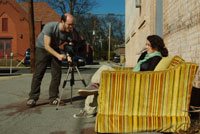US, ARKANSAS: Four college students are preparing to partner with Mozambicans to film a documentary on African development. The students' stated goal for the documentary, tentatively titled “The Kujilana Project,” is to teach villagers video-camera savvy and help them gather footage of local stories pre-dating Mozambique's Civil War and the Portuguese Colonial War.
“The Kujilana Project matters because it's going to give Africans a voice like they've never had before,” said team member Nick Michael, a junior English major at Harding University in Searcy, Arkansas, US. “We'll be handing them our cameras and saying, ‘Take it. You tell your own story. We're not qualified to tell it for you.'”
The team members fear post-colonial Africa is in danger of becoming defined by its crises like AIDS, genocide and poverty, and they aim to supply another side of the story by showing Africa's images of hope.
“We've become numb to a lot of the images that have come out of Africa,” said Tyler Jones, a junior political science major at Harding. “And unfortunately the people holding the camera have been white journalists.”
On 10 June 2009, the team plan to depart for Nomba Village, Mozambique, where two American families run a development centre called Malo Ga Kujilana (MGK), meaning “Place of Reconciliation.” MGK acts as a community resource hub that empowers Nomba Village through various projects including micro-loans, fish farms and child-safe, fuel-efficient stoves.
“MGK believes in an Africa that doesn't need rescuing like Westerners are prone to attempt, John Wayne-style,” said Kelsey Sherrod, sophomore English major at Harding.
Kyle Holton, missionary in residence at Harding, co-founded MGK in 2006. He sees MGK as a means of supplying a community not only with physical commodities, but also with hope.
“MGK serves as a catalyst for creative community development,” Holton said. “We were responding to living with our neighbours, specifically in Nomba.”
The documentary team will partner with MGK and introduce film as a new tool for community development.
“We are going to Africa to tell stories, but we are also going to Africa to listen,” said Maribeth Browning, sophomore journalism major at Samford University in Birmingham, Alabama. “MGK is the perfect place to create this conversation because they too believe in creatively responding to the needs of their neighbours in Nomba.”
The team members are currently raising awareness for the project and collecting funds for film equipment through their website www.kujilana.com. Next fall they plan to edit their footage and submit their film to festivals beginning in 2010. They believe the documentary has potential for development in the States as well.
“In the end, film is a tool of empowerment for everyone, Africans and Americans and even our team,” Sherrod said. “Film helps us understand our fellow human beings by putting faces on Africa.”
The Kujilana Project end-product will be a feature-length, broadcast-quality documentary, filmed by Africans and Americans, that investigates the socio-spiritual aspects of African development. The documentary team plan to leave behind, in Nomba Village, the rudiments of a sustainable film library, which will archive local stories, event footage and how-to development videos. The film crew is comprised of undergraduate students.
View the Kujilana project proposal
For more information go to www.kujilana.com

















